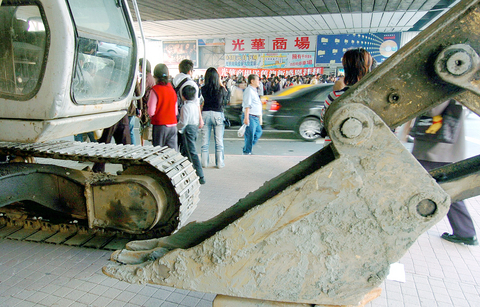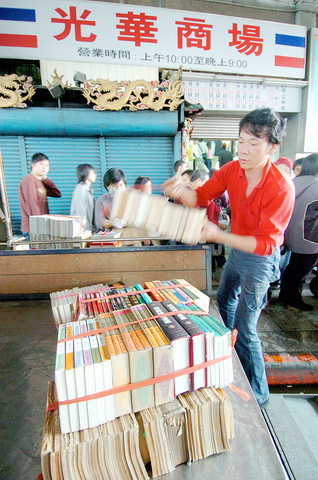Like any other weekend, crowds of book fans and computer geeks gathered in Kuanghua Market (
Due to the Taipei City Government's decision to tear down the Kuanghua overpass because of safety concerns, the 32-year-old market, which is located under the overhead expressway at the corner of Hsinsheng North Road and Bade Road, will be relocated to a new spot in nearby Jinshan North Road.
"I will miss this place a lot, because I have my best college memories here," Victor Huang said (

PHOTOS: LO PEI-DER, TAIPEI TIMES
Huang is among many that carried a camera to take a last picture of the market.
Official opening
Opened on March 8 1974 with the late president Chiang Ching-kuo (

However, the two-floor cement complex later attracted jade and antique retailers.
When the nation's electronics manufacturing started to take off during the 1980s, many retailers in the market began to diversity by selling various electronic parts and equipment.
The merchandise later expanded to stereo equipment, computer software, hardware and other peripherals, as well as music tapes, CDs and DVDs.
The businesses extended from the market to neighboring blocks, and the area emerged as the largest hub of IT product distribution in northern Taiwan.
But Rome wasn't built in a day.
"I remember when I first opened my business here one year after the market was inaugurated, some days it was common to not see one single visitor," said Chang Yung-lung (張永隆), owner of Kingsounds Electronic and Information Square (金嗓子電子資訊社).
Chang, 52, first started his business in the market by selling dry snacks and cookies. Riding the boom of Taiwan's electronics contract making, Chang decided to switch to electronics retailing after about five years of selling food.
"Despite the fact that the market looks old and shabby now, I feel sad about moving from this place ? After all, I have spent most of my life here," Chang said.
Speaking about why the inconspicuous gray complex under the overpass turned into an electronics mecca, Chang said at first, some retailers there made a small fortune from selling second-hand electronic devices and parts obtained from the US military, which withdrew after the US broke diplomatic ties with Taiwan in 1979.
Later, to meet the heavy demand from students of the nearby National Taipei University of Technology (previously known as the Provincial Taipei Institute of Technology), more and more people jumped on the bandwagon of electronics and parts sales, Chang said.
With the clustering effect, shops in the market and the mushrooming upstarts around it were able to outcompete companies in other areas of the city by squeezing costs, making Kuanghua Market the first place people thought about when buying electronics and computer components, he said.
The status of the market has since been unbreakable, regardless of challenges from the emergence of large-scale electronics chains run by Tsann Kuen Group (
Kuanghua Market's business remains booming as always, despite the coming of the electronic commerce era.
"Many people use the Internet to compare prices, but most of them still make their purchases here," Chang said.
While the upper-level bustled with shoppers bargaining for better prices on high-tech products, the underground world attracted book worms of every kind keen to immerse themselves in second-hand martial art novels, comic books, science fiction, and a wide array of other genres, making the market a contrast of new and old, but also an ingenious convergence of traditional reading matter and the latest technology.
Relocation
Although some vendors of 3C products (namely computers, consumer electronics and communications products) have decided to relocate to shops on Bade Road, about 196 Kuanghua Market retailers will move en masse to a temporary venue at the crossroads of Jinshan North Road and Civil Boulevard, before settling down in a yet-to-be-built building behind the crossroads of Hsinsheng South Road.
However, the nearby jade market won't be moving as it is located in a private building.
The temporary site will begin soft-opening on Jan. 18 with a formal unveiling scheduled on Feb. 10, according to the city government's plan.
The construction of the new building to accommodate the retailers is scheduled to begin in February.
The new place is around 100m from the old spot and the city government is targeting its completion for sometime early next year.
"Although I know all the retailers will still be in the new spot, this is an irreplaceable place, full of memories," explained a veteran visitor surnamed Chen.
"I came to have my last visit before it is closed, " he said.
Chen lived in the Kuanghua neighborhood for 20 years before moving to Keelung.
He spent countless weekends in the market's bookstores as a youngster, and later took his wife to join the book feast, and finally his kids.
"I think every city should preserve a few old corners to evoke people's nostalgia for the old times," Chen said, "but as the government gradually tore down the old nooks over time, I don't know what remains for Taipei residents to remind them of the old days."
Despite the sadness of saying goodbye, Tseng Hsueh-hsing (
"I think many of our loyal customers will still call by after we move," Tseng said, while loading books into boxes. "There is no other place in Taiwan to find these treasures."

The US dollar was trading at NT$29.7 at 10am today on the Taipei Foreign Exchange, as the New Taiwan dollar gained NT$1.364 from the previous close last week. The NT dollar continued to rise today, after surging 3.07 percent on Friday. After opening at NT$30.91, the NT dollar gained more than NT$1 in just 15 minutes, briefly passing the NT$30 mark. Before the US Department of the Treasury's semi-annual currency report came out, expectations that the NT dollar would keep rising were already building. The NT dollar on Friday closed at NT$31.064, up by NT$0.953 — a 3.07 percent single-day gain. Today,

‘SHORT TERM’: The local currency would likely remain strong in the near term, driven by anticipated US trade pressure, capital inflows and expectations of a US Fed rate cut The US dollar is expected to fall below NT$30 in the near term, as traders anticipate increased pressure from Washington for Taiwan to allow the New Taiwan dollar to appreciate, Cathay United Bank (國泰世華銀行) chief economist Lin Chi-chao (林啟超) said. Following a sharp drop in the greenback against the NT dollar on Friday, Lin told the Central News Agency that the local currency is likely to remain strong in the short term, driven in part by market psychology surrounding anticipated US policy pressure. On Friday, the US dollar fell NT$0.953, or 3.07 percent, closing at NT$31.064 — its lowest level since Jan.

The New Taiwan dollar and Taiwanese stocks surged on signs that trade tensions between the world’s top two economies might start easing and as US tech earnings boosted the outlook of the nation’s semiconductor exports. The NT dollar strengthened as much as 3.8 percent versus the US dollar to 30.815, the biggest intraday gain since January 2011, closing at NT$31.064. The benchmark TAIEX jumped 2.73 percent to outperform the region’s equity gauges. Outlook for global trade improved after China said it is assessing possible trade talks with the US, providing a boost for the nation’s currency and shares. As the NT dollar

The Financial Supervisory Commission (FSC) yesterday met with some of the nation’s largest insurance companies as a skyrocketing New Taiwan dollar piles pressure on their hundreds of billions of dollars in US bond investments. The commission has asked some life insurance firms, among the biggest Asian holders of US debt, to discuss how the rapidly strengthening NT dollar has impacted their operations, people familiar with the matter said. The meeting took place as the NT dollar jumped as much as 5 percent yesterday, its biggest intraday gain in more than three decades. The local currency surged as exporters rushed to